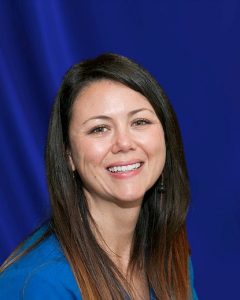Amanda Carroll ’09 (’12 MS) aims to be a three-time Tar Heel alumna after completing her PhD in occupational science as she seeks to better understand the relationships between military service, occupational participation, resilience, and successful aging for older U.S. military veterans.

Carroll, who works as an occupational therapist, grew up in Jacksonville, North Carolina, and comes from a military family.
“I’ve always been interested in military culture and the way it intersects with life,” Carroll said.
During her work as an occupational therapist, and drawing from her life experience, Carroll noticed the veteran population with whom she worked seemed to be resilient, particularly among aging adults.
“Resilience has captured my imagination,” Carroll said. “What are all the factors on the individual and societal level that help people deal with changes as they age? […] There seemed to be something about military service and training that veterans still cued into fifty years later.”
Carroll launched her dissertation research, a mixed-methods study, to explore that question. She is recruiting older veterans to complete a survey that asks them about their time in the military and activities they complete every day. They also complete a perceived resilience scale that asks them to reflect on their aging experience. She is also collecting life history information through interviews.
“Old age brings physical changes and social changes, like retiring,” Carroll said. “I was interested in how certain people respond to that in different ways and how their life course impacted them in older adulthood, especially their occupational engagement” Carroll said.
Carroll said veterans who have completed her survey are humbled by her interest in their lives and in their service.
“A lot have served in combat in Vietnam, and we had some tough conversations,” Carroll said. “They’re willingness to help other veterans says volumes about them as people.”
Carroll said she hopes that insight from older, resilient, veterans will be applicable to the next generation of veterans who might be able to live better lives as they age.
“We’re still actively engaged in the longest-running war we’ve ever been in,” Carroll said. “We have no idea what the consequences of multiple deployments are for these younger veterans.”
Carroll hopes that research contributions to better understand resiliency will span disciplines.
“A health sciences professional might not know a lot about military culture and don’t factor that in when they encounter someone who is older,” she said. “That can be a lost opportunity, because that’s still a salient part of their identity.”
In addition to pursuing her PhD, Carroll teaches second-year occupational therapy students and works part time. In her course, she mentors students to do research linking occupation and resilience in different populations.
“I have found teaching really humbling and inspiring,” Carroll said. “It’s really cool to know I’m helping to train the next generation.”
The Division of Occupational Science and Occupational Therapy is one of seven health sciences programs in the Department of Health Sciences. The DAHS is housed in the UNC School of Medicine.